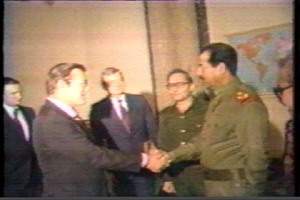Originally posted by The Galatian:
You've been misled. The Phoenix program specifically targeted civilians who were sympathetic to the VC. Most of those killed took no part in combat.
I can appreciate your thoughts on this but, no, I'm neither mislead nor misinformed on this subject.
Douglas Valentine has written a number of books that take selected archived documents and reach false conclusions. Careful observation will show that his writings also attempt to link the Phoenix Program to our Homeland Security program and, of course, blame President Bush and his administration for it. The web site you referenced is also his which he uses to advertise his book. He paints a picture that completely misleads his readers into a false understanding of the purpose and execution of the Phoenix Program. This kind of stuff is really very typical of a lot of writing about the Viet Nam war which tends to solicit some mixed brew of shame and glory for the subjects along with an element of self induced guilt. This works really well if the subject concerns something that was "secret" but is now "revealed". The shelves in book stores are well stocked with these type writings and especially so in the Viet Nam war section. So much for credibility of his writings!
On the plus side, Valetine's web site does provide access to a number of interesting documents but they've been available for a while now and there are many others as well. Reading them together with other credible resources and putting everything into proper context leads to the correct conclusion that the Phoenix Program was not some evil creation of the CIA akin to Hilter's final solution but just a good attempt at dealing with a serious problem in the best way possible. I give thanks to those among us that helped plan and execute the program and I want them to know our country appreciates them and their service and will not permit their reputations to be undeservedly tarnished.
There were misuses of the program, just as there was on conventional warfare, but it was a legitimate RVN government program designed to root out and destroy subversive Viet Cong elements as part of the overall war. We provided advice and support. Yes, the CIA was involved in the early planning of the program but it was an RVN operation and one which the National Police had the lead. We didn't run the program even though we did provide help for it particularly in cordon and search operations when were seeking persons believed to be hiding in a particular hamlet.
It's easy to sift through old records and glean out those that point out shortcomings and failures. Those things do happen in war just like they do in every day civilian life. Man is a fallible being. One of man's weaknesses is our propensity to seek out the negatives in everything. We rarely document the good aspects of things as carefully as we do the bad. Bad news makes good news because it sells. That's true whether it's the evening news, special documentaries, or books that "expose the truth". This "truth" is usually a long ways from reality.
Certainly we, and RVN, were vigorous about pursuing the Viet Cong enemy and rightfully so. Certainly we targeted them to be killed. That's what a soldier does every time he fires a weapon at an enemy! The tactics of the Viet Cong involved true terrorism. Remember, these were an enemy that did not reveal themselves as combatants. The believed in their cause but they had no limits to what they would do to attain it. We, on the other hand, maintained limits according to rules of engagement based upon law or warfare. When those limits were exceeded, and it was known, corrective action including criminal prosecution was taken up. The Viet Cong, however, made heroes of their own.
Linking the My Lai killings to the Phoenix Program is pure speculation and shows a real lack of understanding in how the Phoenix Program worked compared to the conventional operations such as the troops involved in My Lai were. That incident was brought on by the failure of the unit's commander who, for whatever reason, lost all sense of morality and ordered the killing of non-combatants that were no threat to him or his troops. For that he was charged, tried, and sentenced. Unfortunately, because of the politics of the time he was released and did not serve his sentence. It is notable that one of the key reasons his actions were made known was because of the character of other soldiers in the area who saw what had happened and knew it wrong.
That (moral values and compassion) is a key difference between the typical American soldier and many of our enemies. It's something that John Kerry and his organization tried to overshadow with lies about our typical conduct.
Patrick


